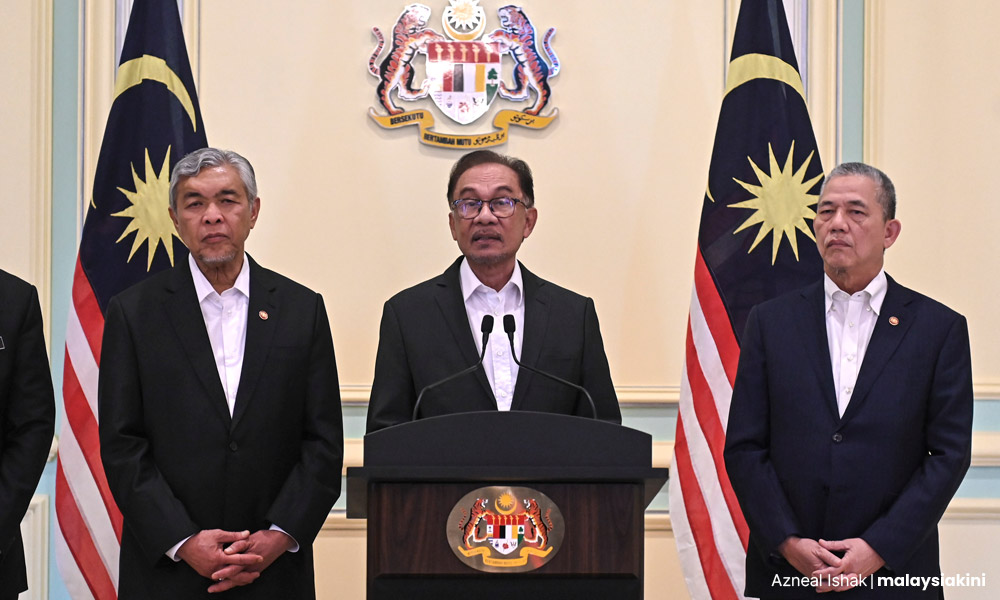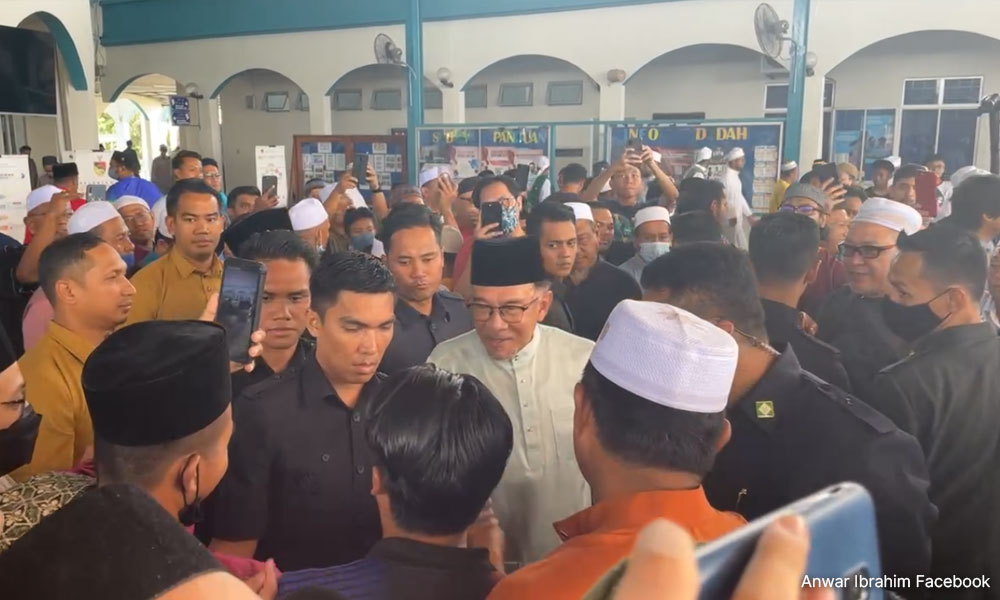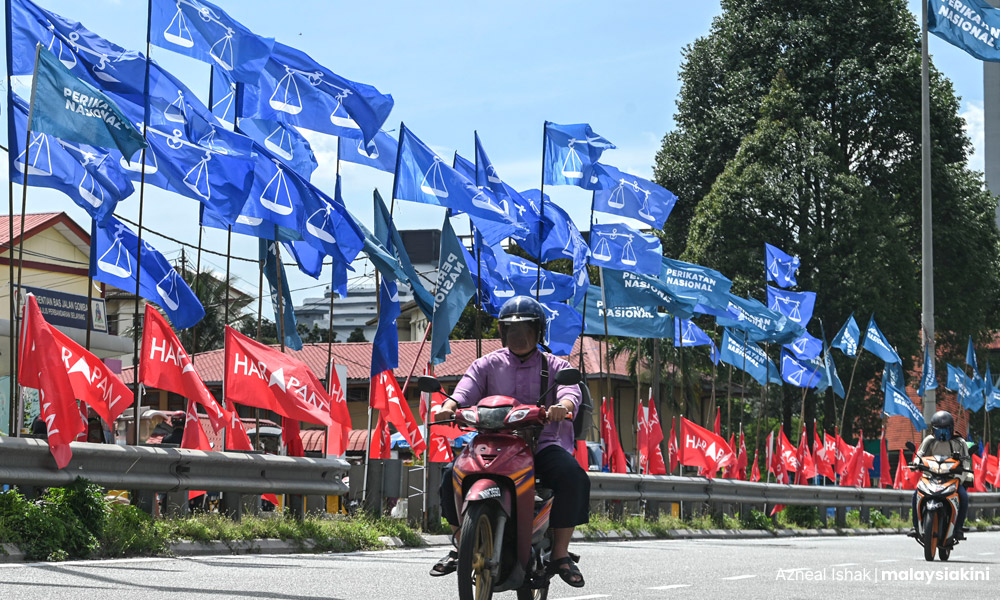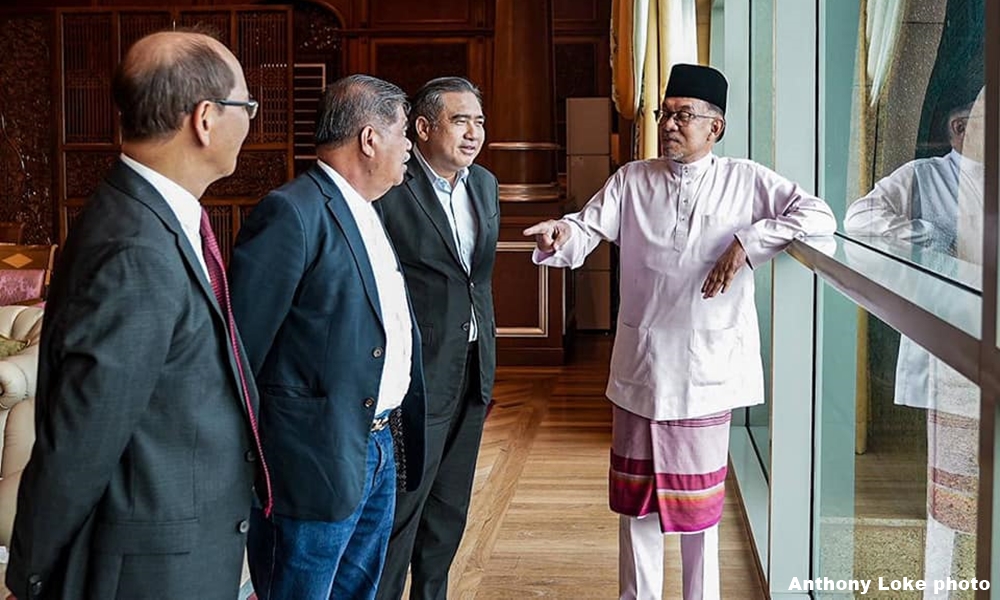Whether it’s 100 days, one year, or two years, the question hanging over the head of Prime Minister Anwar Ibrahim’s coalition government would still be: How long can it last?
The most important determinant is the support of the Malay voters. If Anwar and his government can enjoy the support of enough Malays, then it would survive, because the Malay-based opposition, Perikatan Nasional (PN), would not dare topple the government.
On the other hand, if Anwar and his government fail to win the support of the Malays, then PN would work hard to attack the government as anti-Malay, anti-Islam and, if it fits, anti-palace.
This is to cause panic in the Malays within the government – not just Umno, but even some leaders in PKR and Amanah – to demand the government be more pro-Malay and pro-Islam at the expense of minorities and liberals.
If the government succumbs to the pressure, it would alienate its liberal and minority base with no guarantee that it can catch up on Malay support. PN can then win the 16th general election (GE16) easily.
If the government resists such pressure but cannot find ways to improve its Malay support, internal disputes between the Malay/nationalist and non-Malay/liberal leaders will continue to the extent that most voters would just get tired of the coalition government and either look for stability in PN or simply give up on voting or even Malaysia. PN can then win GE16 easily.
While the Anti-Hopping Law (AHL) deters individual MPs from leaving their parties unless they are convinced they can win the resultant by-elections, BN, GPS, GRS, and Warisan can leave the coalition government without losing seats. PN can then wrest power even before GE16.
None of the above is rocket science or top secret. That’s simply the “Sheraton Move playbook” if you like. Bersatu left the Pakatan Harapan 1.0 government three months after losing the Tanjung Piai by-election when it concluded it could not withstand the communalist attack by Umno and PAS on Harapan.
While there is no power struggle within the current coalition government in the Mahathir-Anwar fashion, the old playbook can be recycled easily.
In 2018, opposition supporters vowed to make Harapan a one-term government and they succeeded ahead of time. With the success of the Sheraton Move, PN leaders – the latest being PAS president Abdul Hadi Awang – hope to deny Harapan even one full term.
Malay approval of Anwar govt
The most important barometer for the Malays’ approval of the Anwar government would be the mid-term state elections for six states (SE6-2023), especially in the Harapan states. The three PAS states are expected to show a similar level of support for PN in GE15.
Harapan currently commands a two-thirds majority in Selangor and Penang while both Harapan and BN control 100 percent of seats in Negeri Sembilan.

Will PN make significant inroads as it did in another multi-ethnic west-coast state, Perak? PAS and Bersatu made a quantum leap in seats from two to 17 for the former and from one (then in Harapan) to nine.
Before SE6-2023, we have two opinion polls to give us some clues.
The first by Merdeka Center showed that 60 percent of Malay respondents are satisfied with Anwar (while 27 percent are unsatisfied) and 49 percent of Malay respondents approved of his government as a whole (while 34 percent disapproved).
As expected, Chinese (73 percent vs 12 percent; 65 percent vs 16 percent) and Indian respondents (91 percent vs 3 percent; 67 percent vs 17 percent) were more positive.
The second by Astro Awani, The Star, Sinar Harian, Sin Chew, and Malaysia Nanban, assisted by O2 Research Malaysia Sdn Bhd, showed that 53 percent of Peninsular Malay respondents saw a deteriorating economy (against 22 percent who saw improvement) and worse, 60 percent of Peninsular Malay respondents saw the nation’s current situation as weak (against 17 percent who saw it as strong).
All other ethnic groups including Sabah and Sarawak bumiputeras all show more positive outlooks.
So, which gives us a more accurate picture? The Merdeka Center survey randomly polled 1,209 respondents by telephone, from Dec 26 to Jan 15. The O2-assisted survey polled 35,077 respondents online, during Feb 6-16.
The keyword is random sampling, meaning the respondents were chosen by chance to best represent the population.
The second survey was done on the five media organisations’ social media, the respondents’ participation was self-initiated, hence, susceptible to ‘self-selection bias’ (certain segments of the population might be more inclined to participate) and even manipulation.

Some pointed out that the gender profile was lopsided in the second survey, with 81 percent male and only 19 percent female. As long as the sampling is not random, even if the sample is controlled or adjusted to be half male and half female, the inference may still be off.
Comparing both, I believe that the Malays’ support for Anwar would be slightly above 50 percent but the figure may fluctuate with events. For example, in a month or two after Anwar’s budget, his approval may improve but if Harapan and BN do badly in the midterm state polls, that may drop.
We should welcome more opinion polls, critically assess them, and demand greater rigour, not dismissing polls out of fear and ignorance. Hence, it is unbecoming of Communications and Digital Minister Fahmi Fadzil to question the motive, sincerity, and honesty of the five media organisations that sponsored the second survey.
In comparison, Mohammad Agus Yusoff, the new director-general of the Community Communications Department (Jkom) under the Prime Minister's Department, who is a political scientist by training, offered professional criticism on Facebook, comparing the two surveys and showed a positive attitude towards surveys.
The middle ground
While the numbers from the five-media online survey are inaccurate, their directions nevertheless provide some pointers for us to reflect on.
Surprisingly, of the 21 percent of respondents who chose BN in GE15, 43 percent saw cooperation between parties in the coalition government as “not well”, and 59 percent of them did not accept the collaboration between Harapan and BN.
While the percentage of BN supporters who are negative towards Harapan cannot be ascertained due to the sampling flaw, they likely have contributed significantly to the 53 percent and 60 percent negative Malay opinions.
And if this is the case for BN supporters, what about PN supporters? How likely may they give a positive response to Anwar and the coalition government even if they do right?

This brings us to the question of ‘middle ground’ – the segment of voters that can be open to most political parties and judge fairly.
Different from the sum of swing voters in all constituencies, the middle ground includes voters who may have a strong partisan preference in the election but can maintain a certain degree of objectivity, open-mindedness, and fairness in making post-election judgements.
The middle ground is what allows multiparty competition to be meaningful and productive, as parties have the incentive to compete for swing votes during elections and to appeal for wider support between elections.
If the middle ground disappears, the electoral landscape is left with only partisans of different persuasions, elections become like ‘census’ as parties would be interested only in “calling the votes out” than appealing to voters beyond their base, and intense interparty enmity persists after the election. Of course, there would be no political stability.
Is Malaysia nearing this dystopian situation? If the five-media survey is accurate, we would have much to worry about but also a small hope.
A constant 40 percent of the respondents rated negatively all 28 ministers except two: Anthony Loke (33 percent) and Hannah Yeoh (39 percent). To what extent such broad rejection is not mainly determined by partisan sentiment (‘they cannot do right because they are from the wrong side’)?

The silver lining is that politicians like Loke and Yeoh manage to appeal to the other side (despite being DAP and Chinese staunchly dismissed by PN). Despite the biased sample, Loke won 49 percent approval, Yeoh 39 percent while in comparison, and Anwar 40 percent.
The best protection against a Sheraton Move is a growing middle ground, which includes voters who would vote PN but can still judge and treat the coalition government fairly. In contrast, a deep partisan divide would work better for PN.
Are Anwar and the coalition government working to expand the middle ground? I am afraid I see an opposite strategy – enticing PN voters and swing voters to swing to the government parties by ‘starving the opposition’ in constituency allocation and federal funding.
Yes, if this strategy works, Harapan and BN would be stronger in the state polls.
What if it does not work, as discrimination against the opposition is conveniently framed as discrimination against Malay Muslims?
The middle ground will shrink further so much so that fewer Malays can give Anwar and his government a thumbs up when they do right, and we would be closer to a Sheraton Move 2.0. Mkini
WONG CHIN HUAT is an Essex-trained political scientist at Sunway University. He is a professor at the university’s Sustainable Development Solutions Network (SDSN) Asia. Mindful of humans’ self-interest motivation while pursuing a better world, he is a principled opportunist.
The views expressed here are those of the author/contributor and do not necessarily represent the views of MMKtT




No comments:
Post a Comment
Note: Only a member of this blog may post a comment.